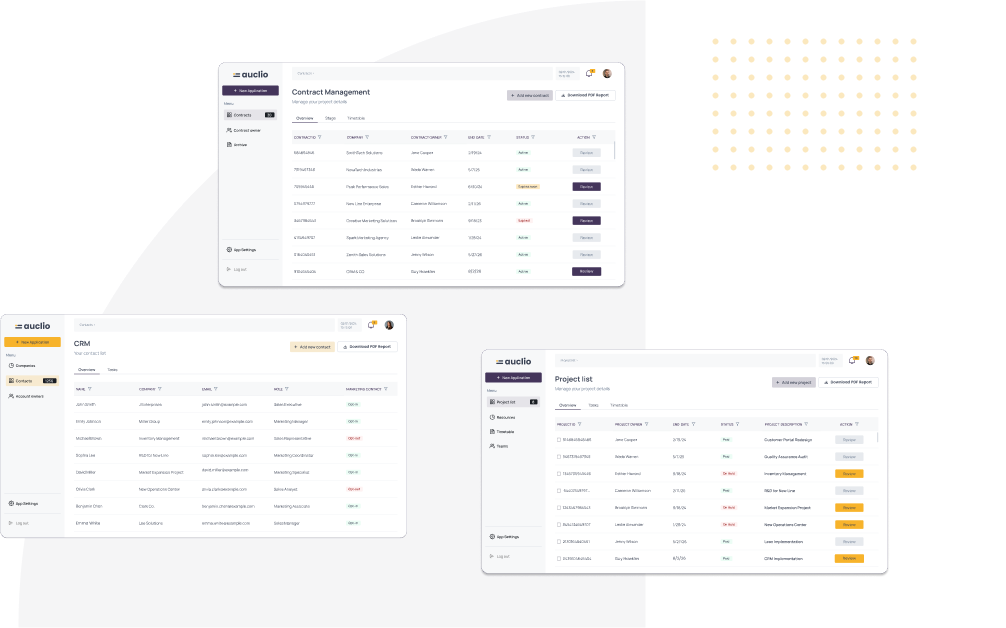
In this article, we’ll explore the various applications you can build with low-code platforms such as Auclio, and show how adaptable these solutions can be for your business needs.
Understanding low-code platforms
Low-code platforms provide a more visual approach to application development. Instead of extensive coding, users can drag and drop components, use visual interfaces, and take advantage of pre-built templates. This approach reduces the complexity and time needed to develop applications, making it easier for people with less technical expertise. Here’s what makes low-code platforms stand out:
- Speed: Faster development cycles without the need for traditional coding.
- Cost efficiency: Reduced need for extensive coding and IT resources, lowering development costs.
- Accessibility: Non-technical users can contribute to the development process or build solutions completely on their own.
- Customization and flexibility: Create tailored solutions that fit specific business needs.
- Collaboration: Improved collaboration between IT and business teams.
Examples of business applications that can be built with low-code platforms
Project management solution
Traditional custom software development for project management can be expensive and time-consuming. Additionally, maintaining and updating custom-built software requires ongoing resources and expertise.
Off-the-shelf project management tools, on the other hand, might not align perfectly with the unique requirements of every business, making it difficult to adapt them to specific needs without costly customizations or workarounds.
Low-code platforms offer a middle ground by enabling businesses to build project management applications tailored to their exact needs without the high costs and long development times associated with custom software.
Customer relationship management (CRM)
Many businesses already have some form of CRM. This might be as simple as maintaining a list of customers and prospects in an Excel file. Low-code platforms can take these a step further, helping businesses to organize their customer data more efficiently, without having to search for some off-the-shelf solution that is often rich in features, but complex and expensive.
Low-code platforms allow businesses to develop tailored CRM systems that track customer interactions and manage sales pipelines. Same as for the project management tools, these customized CRMs can be adjusted to fit each organization’s unique processes and requirements.
Contract management
Contracts with employees, contracts with customers, contracts with suppliers… Managing contracts is an important, but often overlooked business process.
Low-code platforms simplify this by enabling businesses to create customized contract management applications that follow the entire contract lifecycle, from initial drafting to final approval. Additionally, these tools provide centralized storage, making it easier to retrieve and review contracts when needed.
Templates are standardized, review process is simplified and contracts are visible at any time, to everyone with given access rights. This all frees up time for employees to focus on higher-value activities.

Forms and customer portals
Whether it’s for feedback collection, order processing, or customer support, the flexibility of low-code platforms supports a wide range of form and portal applications (for example, customer portals or supplier portals).
Low-code platforms simplify the development of forms and customer portals for data collection and customer interaction. These applications can be customized to match the business’s branding and specific needs.
Other business applications
The application of low-code platforms extends to many other business cases, such as inventory management, HR tools or financial management systems.
The adaptability of these platforms ensures that businesses can create applications tailored to their specific processes and requirements in just days or weeks, rather than months, which is often a case with custom development.
The adaptability of low-code platforms
Thus, a major strength of low-code platforms is their adaptability. Any type of business application can be built using low-code technology. These platforms offer extensive customization options, allowing businesses to tailor applications to their specific needs.
The ability to quickly prototype and iterate on applications means that low-code platforms can evolve alongside your business, adapting to the changing requirements. Also, applications built this way can be easily integrated with your ERP.
Introducing Auclio low-code platform
Auclio is a low-code/no-code information management platform designed to simplify application development. It enables businesses to gather, view, and manage information from various sources without needing extensive coding knowledge. Auclio helps businesses handle complex requirements while maintaining speed and affordability.
Learn how Auclio works and discover some of the internal and external applications that can be built with it.
Conclusion
Low-code platforms like Auclio are transforming how businesses approach application development. By offering a flexible, user-friendly, and cost-effective solution, such platforms enable organizations to quickly implement and adapt business applications. Whether it’s project management tools, CRM systems, contract management applications, or any other business solution, low-code platforms enable businesses to build the applications they need to succeed.



